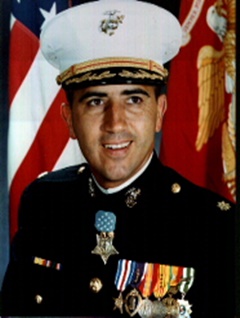VARGAS-JAY
JAY R. VARGAS

COL

Jay R. Vargas, a retired Marine Corps Colonel, is a Medal of Honor recipient for his heroic actions during the Vietnam War. He was born the youngest of four sons on July 29, 1938, in Winslow, Arizona, and at birth was given the name Manual S. Vargas Jr. which he later legally changed. He joined the Marine Corps in 1963. After retiring from the Marine Corps in July 1992, COL Vargas served as the Secretary of the California Department of Veterans Affairs from 1993 to 1998 and in July 2001 he was appointed to the position of Regional Veterans Liaison for the U.S. Department of Veterans Affairs.
When COL Vargas was chosen to be awarded the Medal of Honor he requested that in honor of his mother, M. Sando Vargas, her name be engraved on the back of his Medal of Honor instead of his own. President Nixon honored his loving request thus the name of “M. Sando Vargas” was engraved on the back of the medal when it was presented to him by President Richard Nixon on May 14, 1970. His mother had passed away a few months before her son was presented the medal.
MEDAL OF HONOR CITATION
The President of the United States in the name of The Congress takes pleasure in presenting the Medal of Honor to Major Jay R. Vargas, United States Marine Corps,, for service as set forth in the following citation: For conspicuous gallantry and intrepidity at the risk of his life above and beyond the call of duty while serving as Commanding Officer, Company G, Second Battalion, Fourth Marines, Ninth Marine Amphibious Brigade, in action against enemy forces in the Republic of Vietnam from 30 April to 2 May 1968. On 1 May 1968, though suffering from wounds he had incurred while relocating his unit under heavy enemy fire the preceding day, Major (then Captain) Vargas combined Company G with two other companies and led his men in an attack on the fortified village of Dai Do. Exercising expert leadership, he maneuvered his Marines across 700 meters of open rice paddy while under intense enemy mortar, rocket and artillery fire and obtained a foothold in two hedgerows on the enemy perimeter, only to have elements of his company become pinned down by the intense enemy fire. Leading his reserve platoon to the aid of his beleaguered men, Major Vargas inspired his men to renew their relentless advance, while destroying a number of enemy bunkers. Again wounded by grenade fragments, he refused aid as he moved about the hazardous area reorganizing his unit into a strong defense perimeter at the edge of the village. Shortly after the objective was secured, the enemy commenced a series of counterattacks and probes which lasted throughout the night but were unsuccessful as the gallant defenders of Company G stood firm in their hard-won enclave. Reinforced the following morning, the Marines launched a renewed assault through Dai Do on the village of Dinh To, to which the enemy retaliated with a massive counterattack resulting in hand-to-hand combat. Major Vargas remained in the open, encouraging and rendering assistance to his Marines when he was hit for the third time in the three-day battle. Observing his battalion commander sustain a serious wound, he disregarded his excruciating pain, crossed the fire-swept area and carried his commander to a covered position, then resumed supervising and encouraging his men simultaneously assisting in organizing the battalion's perimeter defense. His gallant actions uphold the highest traditions of the Marines Corps and the United States Naval Service.

